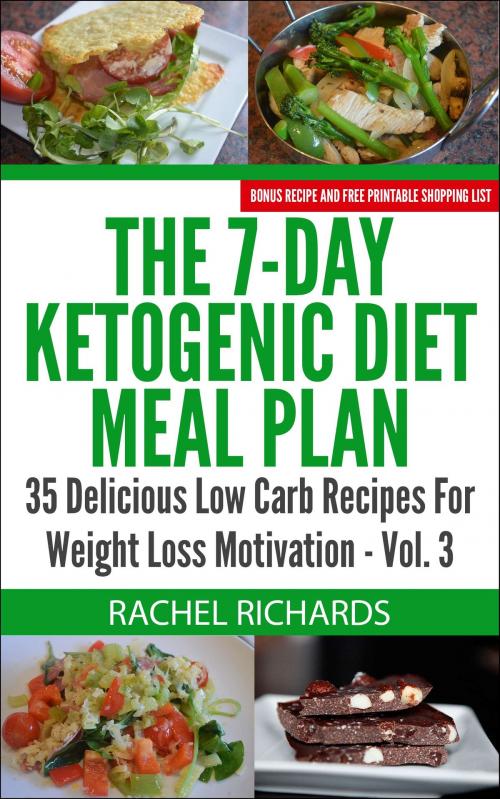The 7-Day Ketogenic Diet Meal Plan: 35 Delicious Low Carb Recipes For Weight Loss Motivation - Volume 3
Nonfiction, Food & Drink, Healthy Cooking, Diabetic, Health & Well Being, Health, Nutrition & Diet, Weight Loss, Diets| Author: | Rachel Richards | ISBN: | 9781987863031 |
| Publisher: | Revelry Publishing | Publication: | December 13, 2014 |
| Imprint: | Language: | English |
| Author: | Rachel Richards |
| ISBN: | 9781987863031 |
| Publisher: | Revelry Publishing |
| Publication: | December 13, 2014 |
| Imprint: | |
| Language: | English |
Anatomy of a Ketogenic Diet
Your body uses what you eat to give you energy. Carbohydrates raise your blood sugar levels, and your body reacts by producing insulin to deal with it. Unfortunately, insulin aids in converting glucose to fat, which is then stored in your body’s cells.
A ketogenic diet is designed to make your body burn fat instead of carbohydrates. It is comprised mainly of a high fat diet with low carb foods and normal levels of protein. Carbohydrates are kept below 60g on a daily basis. Slight overage once in a while is not too bad, but where possible less than 50g is the best way to go. This keeps the body in a state of ketosis, whereby the body is burning fat as the steady source of energy.
The one thing that is sure about dietary requirements whilst on a ketogenic diet, is that of the fat content that you consume. This is essential as part of a ketogenic plan.
Protein content however is a contentious issue – top doctors have varying attitudes to the amount of protein you should consume whilst on this diet, but these tips are for sure:
-Protein is essential for producing energy
-Protein consumption in the first 3-4 weeks of a ketogenic diet should be at optimum levels
-At the beginning of a ketogenic diet, the brain needs extra glucose, and rather than glucose being supplied by loss of muscle mass, the daily intake of protein must be high – suggested minimum levels are between 3-6oz (80-150g) with 5-8oz/140-225g as an optimum level, depending on your weight, height and already established muscle.
-Exercise is important for the continued development of muscle mass and strength.
So certainly you should be optimizing on both protein and fat intake in those critical 4 weeks.
Volume 3 of the 7-Day Ketogenic Diet Meal Plan brings you 35 new delicious low carb recipes for weight loss motivation.
These original recipes provide an additional 7 days of full meal plans for the health conscious.
Similar to Volume 1 and Volume 2, you will find the following:
Breakfast - 7 recipes
Lunch - 7 recipes
Snacks - 14 recipes
Dinner - 7 recipes
Ingredient measurements are given in both imperial and metric.
In addition to the 35 recipes, you will find a few bonuses:
A recipe for 'Posh Coffee'. On those mornings where you don’t really feel like something to eat, substitute it with this thirst quenching and tasty coffee.
As well, a free printable version of the meal plan and shopping list is included.
Just go to the following link to obtain the bonuses:
http://gotorecipecookbooks.com/ketogenic-diet-3/
Download this book now to enjoy your ketogenic diet meal plan.
Anatomy of a Ketogenic Diet
Your body uses what you eat to give you energy. Carbohydrates raise your blood sugar levels, and your body reacts by producing insulin to deal with it. Unfortunately, insulin aids in converting glucose to fat, which is then stored in your body’s cells.
A ketogenic diet is designed to make your body burn fat instead of carbohydrates. It is comprised mainly of a high fat diet with low carb foods and normal levels of protein. Carbohydrates are kept below 60g on a daily basis. Slight overage once in a while is not too bad, but where possible less than 50g is the best way to go. This keeps the body in a state of ketosis, whereby the body is burning fat as the steady source of energy.
The one thing that is sure about dietary requirements whilst on a ketogenic diet, is that of the fat content that you consume. This is essential as part of a ketogenic plan.
Protein content however is a contentious issue – top doctors have varying attitudes to the amount of protein you should consume whilst on this diet, but these tips are for sure:
-Protein is essential for producing energy
-Protein consumption in the first 3-4 weeks of a ketogenic diet should be at optimum levels
-At the beginning of a ketogenic diet, the brain needs extra glucose, and rather than glucose being supplied by loss of muscle mass, the daily intake of protein must be high – suggested minimum levels are between 3-6oz (80-150g) with 5-8oz/140-225g as an optimum level, depending on your weight, height and already established muscle.
-Exercise is important for the continued development of muscle mass and strength.
So certainly you should be optimizing on both protein and fat intake in those critical 4 weeks.
Volume 3 of the 7-Day Ketogenic Diet Meal Plan brings you 35 new delicious low carb recipes for weight loss motivation.
These original recipes provide an additional 7 days of full meal plans for the health conscious.
Similar to Volume 1 and Volume 2, you will find the following:
Breakfast - 7 recipes
Lunch - 7 recipes
Snacks - 14 recipes
Dinner - 7 recipes
Ingredient measurements are given in both imperial and metric.
In addition to the 35 recipes, you will find a few bonuses:
A recipe for 'Posh Coffee'. On those mornings where you don’t really feel like something to eat, substitute it with this thirst quenching and tasty coffee.
As well, a free printable version of the meal plan and shopping list is included.
Just go to the following link to obtain the bonuses:
http://gotorecipecookbooks.com/ketogenic-diet-3/
Download this book now to enjoy your ketogenic diet meal plan.















